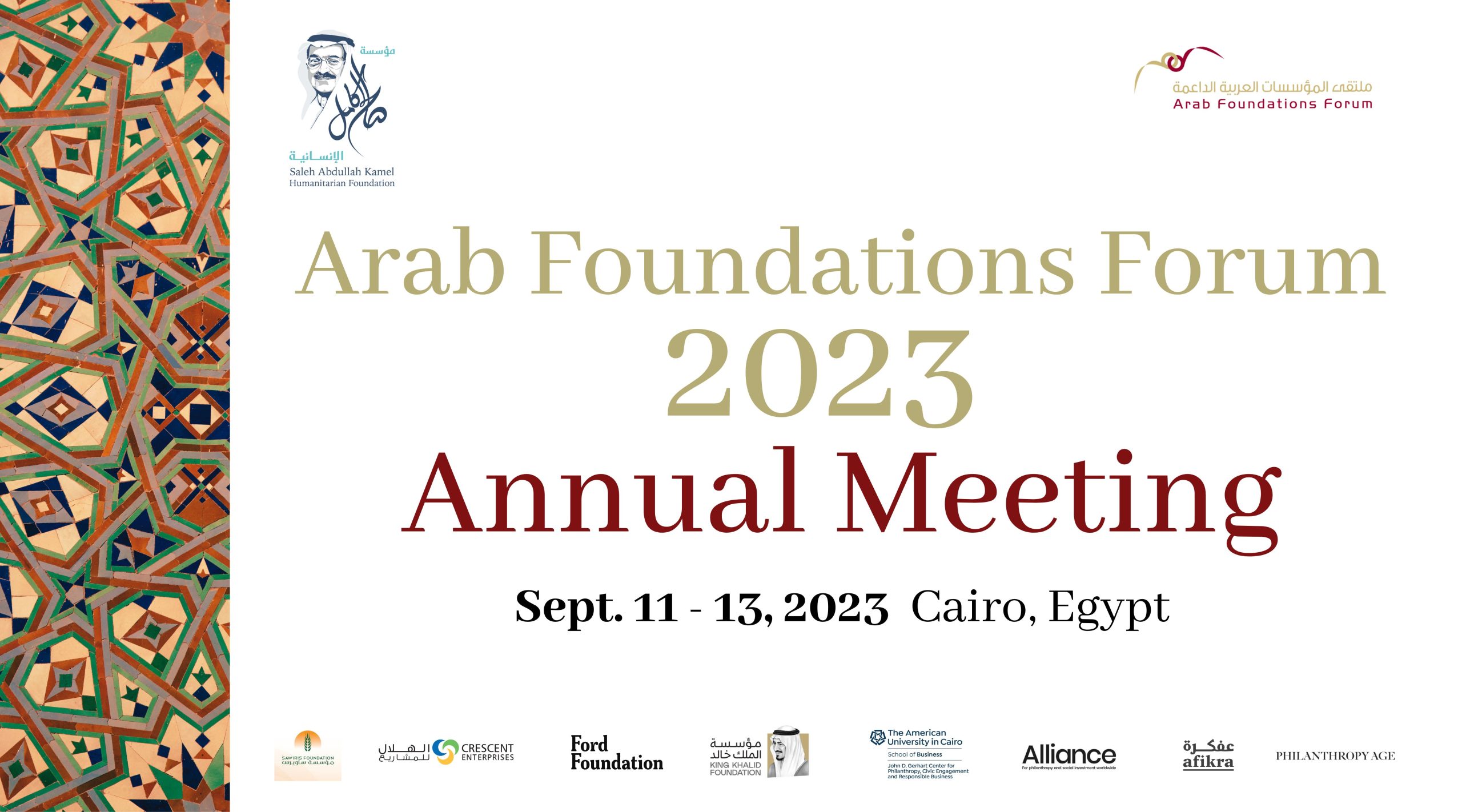From 11-13 September, some of the region’s leading philanthropic voices discussed the most pressing issues facing the Arab region, from climate change and the power of data to youth empowerment and the race to achieve the SDGs.
Packed with engaging panels and workshops featuring experts and changemakers from across the world of Arab philanthropy, all passionate about finding ways to make giving more efficient, effective, and impactful.
Speakers covered timely and urgent issues facing the sector today, such as:
- The future of Arab philanthropy in 2040
- Can green jobs drive employment?
- The intersection of philanthropy, fragility, and the role of the private sector
- Ways to expand trust-based philanthropy in the region
- And how to leverage climate solutions for sustainable development
Given the unfolding conflict in the region, the thoughts of Alliance magazine are with the participants of the Arab Foundations Forum and all those in the region seeking an end to violence and using philanthropy to create a more just and peaceful world.
Conference report
Encountering discomfort at the Arab Foundations Forum
It is said that philanthropy evolved from the Arab region. The practice of ‘Waqf’, under Sharia Law, for example, has existed for centuries, supporting social justice in education, healthcare, and beyond. The Arab Foundations Forum (AFF), held in Cairo in early September set out to revive and reclaim this longstanding reputation and tradition.
Alongside re-thinking philanthropy as a ‘western’ concept, came a sobering acknowledgement of the many challenges facing philanthropy in the region. With youth and women’s unemployment at an all-time high, poverty continues to grow. Political unrest threatens to undo the many wins and civil rights struggles of the Arab Springs, and despite being the richest region in the world for natural resources, the MENA region (Middle East and Northern Africa) is set to be one of the hardest hit by the looming climate crisis. Read more…
Session snapshot
Confronting shrinking civic space in localisation agendas: Creating an ‘enabling environment’ for Arab philanthropy
Creating an ‘enabling environment’ for civil society organisations (CSOs) to grow and thrive is integral to creating appropriate, meaningful, and impactful localisation approaches.
As a result, many speakers at the Arab Foundations Forum (AFF) highlighted that before genuine approaches to localisation can take place, there is an urgent need to create a safe, supportive, and coordinated space for civil society organisations, and other local actors, such as activists and social movement makers, to conduct their work free from excessive regulation, fear, or hostility. Read more…
Reflections from delegates
Sharing my experience: Insights from one of the biggest philanthropy meetings in the Arab region
Between the 11th and 13th of September, over 140 people from 12 countries gathered together to discuss recent trends in philanthropy, the obstacles and challenges, and the future of the sector in the Arab world.
The rooms were full of philanthropic foundations, non-profit leaders, advisors and others who are shaping philanthropy in the Arab region and are willing to collaborate, share insights, connect and learn from one another. This engagement shows the need for such events. Read more…
To measurable impact and beyond; an evolving perception of philanthropy
As various stakeholders gathered at the American University of Cairo for the Arab Philanthropy Forum; core pillars of Arab Philanthropy were highlighted, showcasing a shift in how the world perceives the philanthropic sector.
In his opening speech, Dr. Ahmad Dallal, president of the AUC claims that: “Global Philanthropy is at a decisive moment” as it increasingly looks towards measuring its impact and letting evidence guide its funding decisions. Read more…
A beacon of hope: Arab world philanthropy’s quest towards progress
We stand at a pivotal juncture, with the clock ticking towards the 2030 deadline for achieving the Sustainable Development Goals (SDGs). While organizations are so focused on working towards achieving the SDGs, it is crucial to remember that the journey towards sustainability starts with setting your own goals, rooted in local needs and aligned with broader aspirations.
We stand at a pivotal juncture, with the clock ticking towards the 2030 deadline for achieving the Sustainable Development Goals (SDGs). While organizations are so focused on working towards achieving the SDGs, it is crucial to remember that the journey towards sustainability starts with setting your own goals, rooted in local needs and aligned with broader aspirations. Read more…
Collaborations as a path to sustainable development in the MENA region
My understanding of the ways in which this sector works and how heavily it is regulated was lacking before this annual meeting. In so many ways it helped me to understand what role this sector plays in creating a sustainable development ecosystem in the region but also its limitations and why some of those attempts might be hindered.
My understanding of the ways in which this sector works and how heavily it is regulated was lacking before this annual meeting. In so many ways it helped me to understand what role this sector plays in creating a sustainable development ecosystem in the region but also its limitations and why some of those attempts might be hindered. Read more…
What we talk about when we talk about localisation
As someone who’s been deeply engaged in community engagement and localization work, I couldn’t help but be drawn to the discussions on locally led development during the Annual Arab Foundations Forum (AFF) Meeting. The buzz around this concept was palpable—exciting to witness, but not without its complexities. The exhilaration came from hearing participants champion the idea of power-sharing with local actors. It felt like a collective ‘aha!’ moment—a recognition that true progress hinges on collaboration. However, as the discussions deepened, practical challenges emerged. As a participant from a local Egyptian NGO rightfully noted, donors (and may I add international NGOs) need to reconsider how they refer to their local partners. Too often, they are labelled as ‘implementing’ partners, demoting them to mere executors of decisions made by distant experts. This label inherently strips them of any decision-making power. Read more…













Comments (0)